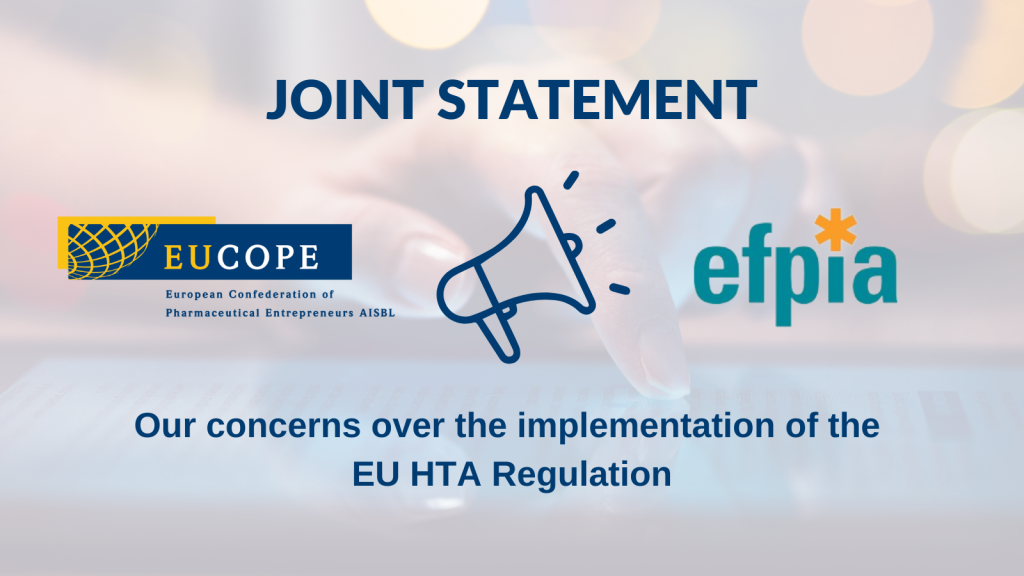EUCOPE Resources / News / Press Releases - October 26, 2022
EUCOPE/EFPIA Joint Statement: Concerns over the implementation of the EU HTA Regulation

The European Confederation of Pharmaceutical Entrepreneurs (EUCOPE) and European Federation of Pharmaceutical Industries and Associations (EFPIA) have concerns on the current direction of the implementation of the EU HTA Regulation.
We are firmly convinced that the input from patient organizations, healthcare professionals, industry and HTA experts and societies enriches the quality of the methodological guidance and processes that will govern the functioning of the HTA Regulation. We are concerned that comments to the various guidance documents by EUnetHTA21 remain largely ignored.
We are also concerned over the direction taken in the guidance itself, where on several methodological and procedural points we see a risk of an administratively complex and burdensome process. The process for Joint Clinical Assessment (JCA), the main output of Member State cooperation under the new regulation, should seek an alignment on common European methodologies and information requirements and harmonized HTA criteria, rather than a mere amalgamation of national practices which would undermine the goals of the Regulation. The approach proposed by EUnetHTA21 merely exports today’s fragmentation in requirements to the European level. Also, health technology developers with their unique insights as main contributors of evidence for a joint clinical assessment should be given the opportunity to bring in their perspective during the scoping process.
Stakeholder engagement and inclusion is a critical step of Better Regulation Principles and is the best quality assurance for this implementation phase of the HTA Regulation, ensuring both the effectiveness and acceptance of the future joint work. The date of application for the regulation is rapidly approaching, and it is crucial to the success of the EU HTA procedure to get this right from the beginning.
Ultimately, the implementation of the HTA Regulation means a change in mindset, in ways of working, in methodology. For the HTA agencies as much as for the various health technology developers of all sizes that will adapt their operations to ensure the new framework becomes an opportunity for improved clinical evidence assessment. A well-designed, high quality EU HTA system is the best system to deliver for patients across the EU. Both, HTA agencies and health technology developers need to be willing to make the required changes to guarantee a good outcome in the implementation of this Regulation.
EUCOPE and EFPIA recognize this is a critical moment for the success of the EU HTA Regulation. We therefore call for a constructive dialogue with the European Commission and the newly established Coordination Group, to ensure Regulation (EU) 2021/2282 on health technology assessment meets its intended objectives of enhancing timely patients’ access to innovative therapies, reducing the burden for developers and HTA bodies alike and contributing to strengthening Europe’s attractiveness as a first-launch region.
EUCOPE-EFPIA Joint Statement – EU HTA Implementation (26/10/2022)
Background:
In 2021, the European Commission contracted a consortium of 13 HTA agencies (EUnetHTA21) to draft methodological and procedural guidance to assist the Coordination Group and the European Commission in the preparation for the implementation of the EU HTA Regulation, which will deliver an EU Joint Clinical Assessment from 2025.
We welcomed the ambition and the stated intention of the mandate given to EUnetHTA21, to involve stakeholders and EU HTA experts to facilitate buy-in in such a crucial exercise. In the last six months, EUnetHTA21 have issued twelve guidances for public consultation, with three more remaining. Various stakeholders including industry associations, patient organizations, healthcare professionals, and HTA experts and societiesinvested time and resources to provide detailed input, with the understanding that their input would be taken into account.
With the publication of the final version of the much-awaited Scoping Guidance this month however, we regret the missed opportunity to develop a process that is built upon a streamlined and truly European assessment. More than 400 comments provided by various stakeholders’ organisations have had little to no impact in the preparation of the guidance, with only a few lexical changes made in the final published document. We worry that the lack of consideration and openness towards the contribution of stakeholders may undermine not just the quality of this important preparatory work but also the ability to deliver on all the objectives of the HTA Regulation.
Based on the finalized EUnetHTA21 deliverables published so far, we fear that the implementation process might lose sight of the objectives of the EU HTA Regulation. This is intended to provide a predictable and more effective system for joint clinical assessment (JCA) for both developers and HTA agencies, by reducing the administrative burden derived from the fragmentation of multiple and divergent parallel procedures and data requests for the assessment of a given technology across Member States (see HTAR Recitals 6, 9, 10, 11, 12, 13)[1].
This goal is achievable if there is appropriate interaction between industry, patients, clinicians, and HTA agencies on the relevant aspects of the JCA process. The pharmaceutical industry has a unique and considerable experience working across multiple HTA bodies and methods, understanding the opportunities for increased harmonisation. Whilst acknowledging the need for the independence of the HTA process, we believe that this knowledge needs to be incorporated in the new European system to deliver high quality joint work right from its start in 2025.
During the preceding EUnetHTA Joint Actions, the pharmaceutical industry has actively contributed to the development of an EU-level framework for cooperation in HTA, as companies participated in piloting joint relative effectiveness assessments (Joint REAs) and early scientific consultations (Early Dialogues). The ability for the manufacturer to be actively consulted in the planning phase of the joint clinical assessment – like in the preceding pilots of the various Joint Actions – was an important criteria for industry to support the EU HTA Regulation when it was proposed in 2018. Since its inception, we firmly advocated for a European HTA that is built on an evidence-based process and that can pool together expertise, knowledge and insights, to achieve the highest level of quality and, ultimately, to accelerate patient access.
